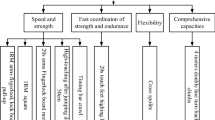Abstract
In order to obtain scientific quantitative decision-making of physical education integrated ideological and political teaching in college, and improve the teaching effect of college physical education integrated ideology and politics, a teaching effect evaluation model of physical education integrated ideology and politics based on principal component analysis is proposed. Clear teaching contents, activities planning and organization, sports teams, such as evaluation index, according to each evaluation index, data collection and initial evaluation, in combination with principal component analysis (pca), assimilation process evaluation index, and correlation matrix eigenvalue and characteristic vector and determine the number of principal components, fuse the sports education teaching effect evaluation model of the building. Experiments show that the model of the linear correlation coefficient and the rank correlation coefficient of average 97.3% and 96.7%, respectively, were higher than other methods, fusion and its various professional sports education teaching effect are present must rise, the score of one of the English major students score increased 0.75, the lowest building professional and a higher level of ascension 0.12. The accuracy of the evaluation results of the model in this paper is higher, which can effectively improve the effect of college sports integrated ideological and political teaching.




Similar content being viewed by others
References
Shuai L, Dongye L, Gautam S et al (2021) Overview and methods of correlation filter algorithms in object tracking. Complex Intell Syst 7:1895–1917
Papaioannou A, Milosis D, Gotzaridis C (2019) Interdisciplinary teaching of physics in physical education: effects on students’ autonomous motivation and satisfaction. J Teach Phys Educ 39(2):1–9
Su L, Xiao L, Wang J (2021) A case study of the ideological and political education of college english translation course driven by words. Creat Educ 12(2):317–328
Yu RR (2020) Research on the reform model of mathematics teaching integration into ideological and political education based on school cloud platform. Creat Educ Stud 08(6):1126–1129
Hao T (2020) The status quo and countermeasures of the construction of primary school teachers under the concept of “curriculum thinking.” Adv Educ 10(4):443–446
Wang Y, Luo Y (2021) Research on the integration of ideological and political elements in the teaching of professional courses—taking the course of “automobile consumption psychology” as an example. Open Access Libr J 08(2):1–5
Liu S, He T, Dai J (2021) A survey of CRF algorithm based knowledge extraction of elementary mathematics in Chinese. Mob Netw Appl 26(5):1891–1903
Gao P, Li J, Liu S (2021) An introduction to key technology in artificial intelligence and big data driven e-learning and e-education. Mob Netw Appl 26(5):2123–2126
Shuai L (2019) Introduction of key problems in long-distance learning and training. Mob Netw Appl 24(1):1–4
Li Q (2020) Evaluation method of English and American literature classroom teaching quality based on fuzzy analytic hierarchy process. Dyn Syst Appl 29(4):21–26
Wang Y (2020) Ideological and political teaching model using fuzzy analytic hierarchy process based on machine learning and artificial intelligence. J Intell Fuz Syst 40(6):1–13
Yang QK, Zhao SP, Liang CY (2020) The construction of quality evaluation system of “big data + ideological and political education” based on “second classroom achievement report.” Heilongjiang Res Higher Educ 38(2):6
Wang S, Liu X, Liu S, et al. Human short-long term cognitive memory mechanism for visual monitoring in IoT-assisted smart cities. IEEE Int Things J. https://doi.org/10.1109/JIOT.2021.3077600
Zhang YL (2020) Simulation of network delay feature extraction based on principal component analysis. Comput Simul 37(3):301–304
Olasege BS, Zhang S, Zhao Q et al (2019) Genetic parameter estimates for body conformation traits using composite index, principal component, and factor analysis. J Dairy Sci 45(02):145–152
Ait-Sahalia Y, Xiu D (2019) Principal component analysis of high-frequency data. J Am Stat Assoc 114(525):287–303
Schipper N, Deun KV (2020) Model selection techniques for sparse weight-based principal component analysis. J Chemometr 45(529):1145–1152
Roberge JB, Harnois-Leblanc S, Mcnealis V et al (2021) Body mass index Z-score vs weight-for-length Z-score in infancy and cardiometabolic outcomes at age 8–10 years. J Pediatr 15(2):15–25
Simian LI (2020) Comprehensive evaluation on the level of agricultural economic development in Hubei province based on principal component analysis. Asian Agric Res 12(08):34-35+43
Franklin JB, Sathish T, Vinithkumar NV et al (2020) A novel approach to predict chlorophyll-a in coastal-marine ecosystems using multiple linear regression and principal component scores. Mar Pollut Bull 152(1):110902
Shuai L, Shuai W, Xinyu L et al (2021) Human memory update strategy: a multi-layer template update mechanism for remote visual monitoring. IEEE Trans Multimed 23:2188–2198
Author information
Authors and Affiliations
Corresponding author
Ethics declarations
The authors have no relevant financial or non-financial interests to disclose. Xuekai Chen provided the algorithm and experimental results, wrote the manuscript, Jianbo Yu revised the paper, supervised and analyzed the experiment. We also declare that data availability and ethics approval is not applicable in this paper.
Additional information
Publisher's note
Springer Nature remains neutral with regard to jurisdictional claims in published maps and institutional affiliations.
Rights and permissions
About this article
Cite this article
Chen, Xk., Yu, J. Evaluation Model of Physical Education Integrated Ideology and Politics Based on Principal Component Analysis. Mobile Netw Appl 27, 1240–1251 (2022). https://doi.org/10.1007/s11036-022-01944-4
Accepted:
Published:
Issue Date:
DOI: https://doi.org/10.1007/s11036-022-01944-4



